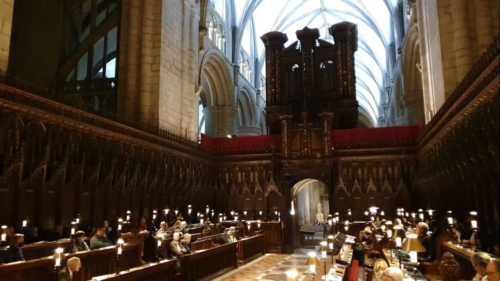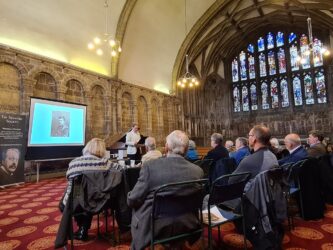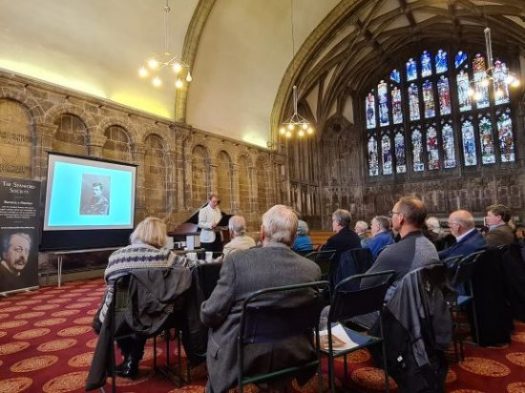 United Kingdom Stanford Society Festival Weekend: Gloucester Cathedral and Chapter House, 2.10.2021. (JQ)
United Kingdom Stanford Society Festival Weekend: Gloucester Cathedral and Chapter House, 2.10.2021. (JQ)

The Stanford Society was founded in 2007 to promote interest in the music of Sir Charles Villiers Sanford (1852-1924). Annually, the members hold a Celebration Weekend, which includes performances of music by Stanford, and by complementary composers, as well as talks about his life, music and career. Previous venues for this weekend have included Cambridge, London, Oxford and Dublin. This year, the weekend – postponed from 2020 due to the COVID pandemic – was held in Gloucester. The city may not have quite the same degree of close connection with Stanford as, say, Cambridge or Dublin, but it is one of the three host cities of the Three Choirs Festival, which frequently performed music by Stanford during his lifetime, with the composer often present for the concerts. Furthermore, Gloucester Cathedral’s Director of Music, Adrian Partington, is a noted exponent of Stanford’s music, not least for his pioneering revival and recording of the Mass Via Victrix, Op.173 (review click here).
I am not a member of the Stanford Society but I was able to attend a few of the events at this Celebration Weekend. Mostly these were held in the Chapter House of Gloucester Cathedral, though one event – an organ recital – was held in the cathedral itself. In addition, at the weekend’s three main services in the Cathedral, two Choral Evensongs plus Sunday morning Eucharist, Adrian Partington and the Gloucester Cathedral Choir honoured Stanford by singing a generous amount of his liturgical music. Incidentally, there was no question that any of this music was simply dusted off for the occasion: all of it comes from the choir’s core repertoire.
The Saturday programme took the form of a symposium in which the focus was on Stanford and two of his pupils, Herbert Howells and Ivor Gurney. Sadly, other commitments meant that I had to miss several of the components of the day. These included two talks by Jeremy Dibble, one on ‘Stanford and the Three Choirs Festival’ and the second entitled ‘Parry’s Creative Process’. I was also obliged to miss Jonathan Clinch’s talk, ‘The Howells-Stanford Relationship Reconsidered’. I was equally sorry to miss a morning recital by Colleen Ferguson (violin & viola) and Jeremy Dibble (piano), which included music by Stanford, Howells, Elgar and Coleridge Taylor. However, in the afternoon I passed a rewarding couple of hours firstly listening to a talk on Ivor Gurney by the composer Ian Venables followed by a recital given by James Gilchrist (tenor) and Adrian Partington (piano). Later, I was able to return to the Cathedral for an early evening organ recital by Adrian Partington.
‘Brighter Visions’ – the Life and Music of Ivor Gurney: Ian Venables, Gloucester Cathedral Chapter House.

Ian Venables gave an afternoon talk on Gurney, illustrated by several short recordings of his music. Venables is very well, perhaps uniquely, qualified to talk about Gloucester’s composer-poet. As a composer, I have long thought that in his music, especially his songs, he has picked up Gurney’s mantle in the way he illuminates and enhances poetry, often echoing the strain of English melancholy that pervades so much of Gurney’s output. Furthermore, in his selection of texts to set as songs, Ian Venables displays a discernment similar to Gurney. It is no surprise that Ian Venables serves as Chairman of the Ivor Gurney Society.
Venables’ hour-long talk was an informed and very sympathetic tour d’horizon of Gurney’s life and creative output. Unsurprisingly, Stanford featured strongly in the first half of the talk; as Venables reminded us, Gurney was one of the most challenging ‘if not truculent’ of Stanford’s pupils at the Royal College of Music. To Stanford, Gurney appeared dishevelled and ill-disciplined, yet the older man persevered because he had the perception to recognise Gurney’s potential. Ian Venables covered Gurney’s student days at the RCM and his experiences at the Front in World War I, reminding us that it was something of a miracle that so fine a song as ‘By a Bierside’ was composed while Gurney was serving in France.
Later, Venables dealt compassionately with the post-war decline in Gurney’s mental health. Rightly, he reminded us that this was not an uninterrupted decline; for example, in 1925 alone, Gurney composed some 50 songs while he was confined in the asylum were composed. He played us a recording of one of these songs. ‘World Strangeness’, which I don’t recall hearing before. Gurney’s music echoes the title of the poem in its strangeness; it is an intense and sad song. On returning home I looked at the list of musical works included in Kate Kennedy’s new biography of Gurney, Dweller in Shadows, which I’m currently reading; the list of pieces for 1925 alone is quite astonishing in its length.
Ian Venables recounted Gurney’s last days. At the end of his talk, he played a fine recording of Gurney’s song ‘Sleep’. I have long regarded this as one of the greatest of all English songs. It was extremely moving to hear it sung on this occasion while we saw a picture of Gurney’s gravestone in the churchyard of Twigworth Parish Church projected onto a large screen.
This was an excellent, well-considered overview of the life and works of Ivor Gurney and it teed up nicely the recital of British songs which followed immediately afterwards.
Gurney, Howells, Stanford, Neil Cox, Venables: James Gilchrist (tenor), Adrian Partington (piano) Gloucester Cathedral Chapter House.
Into a recital lasting about an hour, James Gilchrist and Adrian Partington packed no less than 16 songs. Furthermore, before singing several of the songs Gilchrist read the poem which we were about to hear set to music. I liked this touch, not least because through his excellent spoken deliveries, James Gilchrist gave additional evidence of his engagement with the words.
In the opening group of four Gurney songs it was clear that Gilchrist’s plangent, yet firm tone, was ideally suited to this music. I especially enjoyed the expressiveness with which he sang ‘Snow’ and the eloquent delivery of ‘Severn Meadows’. It was good to follow Gurney with three songs by Howells. The two were friends and musical comrades in arms, both at Gloucester Cathedral (under Herbert Brewer’s tutelage) and then at the RCM (with Stanford). Yet, as Kate Kennedy points out in her aforementioned biography and Ian Venables had also referenced in his talk, Gurney struggled to gain acceptance at the RCM. On the other hand, Howells won all the prizes and accolades on offer. It is slightly ironic, then, that while many of Gurney’s songs are staples of the repertoire Howells’ contributions to the art song genre remain an underappreciated part of his output. Gilchrist gave us three songs. In the opening ‘Goddess of Night’ Adrian Partington’s expert weighting of the piano chords really established the song’s air of mystery while Gilchrist was an ideal exponent of the long, expressive vocal lines. The group ended with ‘King David’, another in the small pantheon of truly great English songs. Gilchrist really drew the audience into the situation of the poem, identifying with the king’s deep melancholy. Gilchrist and Partington gave a superb performance of this mini masterpiece.
From two Stanford pupils, the focus shifted to their teacher in the first of two Stanford groups. In ‘La Belle Dame Sans Merci’ Stanford shows his debt to the German ballad tradition exemplified by the likes of Carl Loewe. Gilchrist really told the story; his singing was vivid, and he made terrific use of dynamic contrasts – at times his tone was almost overpowering in the Chapter House acoustic. Adrian Partington despatched the almost Lisztian piano part excitingly. The tranquil, expressive ‘A Soft Day’ was an ideal contrast. Those two songs are well known but ‘Prospice’ (1884) is much less familiar. It is a setting of a poem that Robert Browning wrote shortly after the death of his wife. In his biography of Stanford Jeremy Dibble describes this song as ‘a stormy deliberation on man’s fear of death and his willingness to face its terrors in order to seek the piece beyond’. I didn’t know the contents of James Gilchrist’s programme in advance so I only looked up that description afterwards. However, Dibble’s words fitted to a tee the intensely dramatic performance we heard from Gilchrist and Partington. In my notes I scribbled ‘defiant against the odds’, which is how the song was projected.
We then heard two songs by Neil Cox (b.1955), taken from a recently composed set entitled There was a time. I believe I am right in saying that Cox was formerly the Director of Music at Lancing College; he retired to Gloucester a few years ago. I haven’t had many opportunities to hear his music, but I recall being impressed by his 1980 choral work War in Heaven a few years ago (review). We heard settings of Herrick’s famous poem ‘To Daffodils’ followed by ‘Nothing Gold can Say’ by Robert Frost. The Herrick setting surprised me – in a good way. Bold piano flourishes set the tone for a setting that contained passages that were unexpectedly dramatic, interspersed with more tranquil, lyrical episodes. Those latter episodes were what I had (lazily) expected but Cox’s approach was invigorating. The Frost setting featured long, slow-moving vocal lines which Gilchrist sang with great expression. This is a lovely song. Subsequently, I learned that this was the first performance of these songs. The composer was present to see his songs warmly received. I was impressed by them and should like to hear the full set.
Ian Venables is an exact contemporary of Neil Cox. James Gilchrist gave us two songs from Venables’ A. E. Housman cycle Songs of Eternity and Sorrow. Introducing the songs, Gilchrist pointed out that the theme of the poems chosen by Venables for this cycle illustrate ostracism and surely reflect the poet’s own life experiences. ‘Oh, who is that young sinner’ received a bitter, biting performance, as befits both words and music. Both singer and pianist articulated the music very strongly, projecting it powerfully. At first, ‘Because I liked you better’ presented a strong contrast, opening in a mood of exquisitely regretful melancholy. However, performers and composer turned the screw as the song unfolded, racking up the tension and sadness. These two fine performances, in the composer’s presence, served as a reminder, if it were needed, that Ian Venables is a masterly composer of art songs.
Finally, James Gilchrist and Adrian Partington returned to Stanford. First, we heard ‘When in the Solemn Stillness of the Night’, one of the four songs that comprise A Triumph of Love (1903). This is a very fine song and Gilchrist demonstrated great commitment, building the setting to an impassioned climax. He ended, though with something completely different: ‘Glengall’, a short extract from the opera Shamus O’Brien (1896). I recently encountered this on a new CD of Stanford songs and I admit I was less than wholly convinced (review click here). Hearing it live and delivered with great comic relish by James Gilchrist made me reconsider; it made a lively conclusion to the recital.
I enjoyed this recital very much indeed. The selection of songs was discerning and varied. The performances by James Gilchrist and Adrian Partington were superb in all respects.
Bach, Ethel Smythe, Stanford, Howells: Adrian Partington (organ), Gloucester Cathedral.
The final musical performance of the Stanford Society’s symposium was an organ recital by Adrian Partington, Gloucester Cathedral’s Director of Music.
He opened with Bach’s Fantasia and Fugue in G minor, BWV 542. His account of the complex and chromatic Fantasia was commanding. Introducing the recital, he told us that the fugue is based on a Dutch folk song on which Bach was instructed to improvise when he auditioned (unsuccessfully) for a post in Hamburg. From these musically humble origins Bach constructed a terrific fugal edifice – has anyone ever surpassed Bach in his ability to write organ fugues? Partington’s performance had all the energy and drive that the music needed.
There was a Stanford link in the choice of three Chorale Preludes by Ethel Smythe: both composers studied in Leipzig. These three short preludes are taken from a set of five which she composed between 1882 and 1884. Well played here, the music is very firmly in the German tradition. So far as I have been able to establish, all of Dame Ethel’s organ music dates from 1882-84 with the exception of one piece composed in 1938. Organ music formed a tiny part of her output but the same is far from true of Stanford. His Fantasia and Toccata in D minor, Op.57 (1893) was written for Sir Walter Parratt. Its inclusion here was especially perceptive because, as I discovered later, Jeremy Dibble believes that the Fantasia is ‘clearly modelled’ on the corresponding section of BWV 542. Partington made the opening of the Fantasia terrifically arresting and his performance gave the music a very suitable improvisatory feel. In the loud passages the Gloucester organ sounded magnificent. The Toccata is quite jolly and this performance had plenty of vigour.
We heard two short pieces by Howells. Here was a nice link. It’s well known that Howells was a pupil of Stanford; perhaps less well known is that, as Partington mentioned in his introduction, Howells was one of his own teachers at the RCM. ‘St Louis comes to Clifton’ is a highly chromatic composition with something of an air of mystery to it which was well conveyed here. By contrast, ‘Flourish for a Bidding’ is a strongly rhythmic piece which here received an exuberant performance.
Fittingly, music by Stanford closed the proceedings. After a short Choral Prelude, written in memory of Parry, Partington turned his attention to the Sonata No.4 in C minor ‘Celtica’. Op.153 (1918). I have heard the organist play this sonata before. That was at a recital in the cathedral in October 2020, when the UK was between COVID lockdowns. On that occasion the audience was seated in the nave. Now I sat in the quire and I fancy I heard the organ to better advantage.
The sonata, which is in three movements, is a big piece; tonight, it played for about 23 minutes. Much the biggest movement is the opening Allegro molto moderato. Partington made the music sound imposing and made the most of the flamboyant episodes. The second subject is tranquil and its lyrical qualities were brought out every time this material reappeared. The full resources of the Gloucester organ were frequently deployed in an exciting, well contrasted performance. The second movement is a pleasing set of well-crafted variations which here provided a good contrast with the preceding movement. The finale is based on the familiar tune ‘St Patrick’s Breastplate’. This is something of a compositional tour de force, including a passage in canon and, subsequently, what sounds to me like a fantasia on the tune. Stanford’s finale is full of invention and it was shown to best advantage in a skilled and exciting performance.
This varied and excellently played recital rang down the curtain on the symposium in great style.
The members of the Stanford Society gathered in Gloucester on a day when the squally weather didn’t show the city at its best. However, they had the benefit of gathering in the city’s wonderful cathedral and it was fitting that Stanford’s two illustrious Gloucestershire-born pupils should share the spotlight with their teacher.
In its relatively short history, the Stanford Society has done great work to advance awareness of the music of Sir Charles Villiers Stanford. They have been conspicuously active in sponsoring recordings of his works and a look at the Society’s website not only details the recordings that they have helped to bring into being but also gives details of some future projects. And I suspect they have their eyes firmly on 2024 and the centenary of Stanford’s death. Having experienced some of their events this weekend, I hope they will return to Gloucester at a future date.
John Quinn
